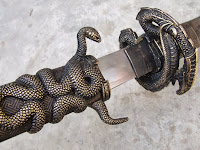Samhain (pronounced /ˈsɑːwɪn/ SAH-win or /ˈsaʊ.ɪn/ SOW-in) is a Gaelic festival celebrated from sunset on 31 October to sunset on 1 November. It comes at the end of the harvest season about halfway between the autumn equinox and the winter solstice.
It the beginning of winter or the "darker half" of the year. The souls of the dead were also thought to revisit their homes. Feasts were had, at which the souls of dead kin were beckoned to attend
and a place set at the table for them.
Mumming and guising
were part of the festival,
and involved people
going door-to-door
in costume (or in disguise),
often reciting verses
in exchange for food
|
| Do Not Stand at My Grave and Weep is a poem written in 1932 by Mary Elizabeth Frye. The identity of the author of the poem was unknown until the late 1990s, when Frye revealed that she had written it. Although the origin of the poem was disputed until later in her life. Her claim was confirmed in 1998 after research by Abigail Van Buren. | She was orphaned at the age of three and moved to Baltimore when she was twelve. She was an avid reader with a remarkable memory. In 1927 she married Claud Frye, who ran a clothing business, while she grew and sold flowers. The poem for which she became famous was originally composed on a brown paper shopping bag. Because people liked her twelve-line, untitled verse, she made many copies and circulated them privately. She never published or copyrighted the poem. (Wikipedia) |
The "definitive version"
from Frye's obituary, November 5, 2004 as published by The Times and The Sunday Time, |
Do not stand at my grave and weep,
I am not there; I do not sleep.
|
I am a thousand winds that blow,
|
I am the diamond glints on snow,
|
I am the sunlight on ripened grain,
|
I am the gentle autumn rain.
|
| When you awaken in the morning’s hush... | I am the swift uplifting rush Of quiet birds in circled flight. |
I am the soft stars that shine at night.
Do not stand at my grave and cry, |
I am not there; I did not die.
Happy Halloween |
 |
Enjoy
© 2013 MU-Peter Shimon












































